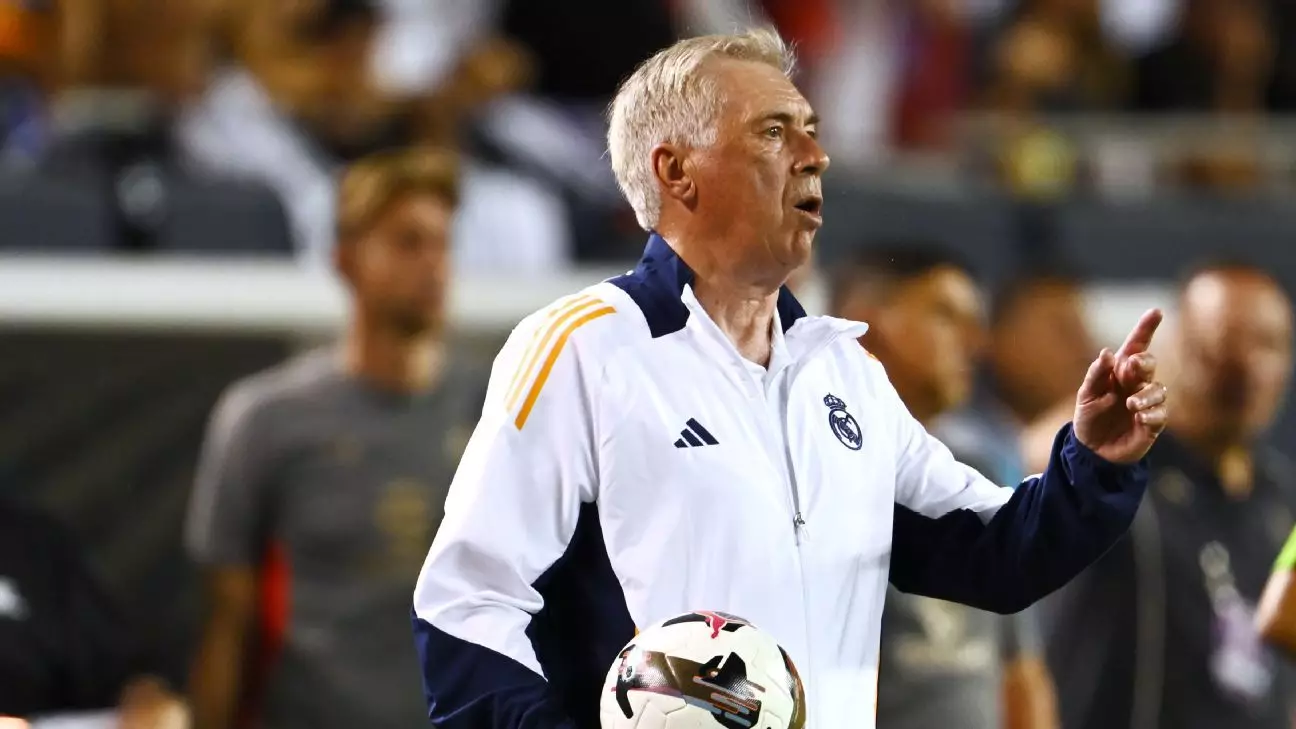In the fast-evolving world of football, where the demands on players are escalating, the dialogue between coaches, clubs, and players is becoming increasingly critical. Real Madrid’s head coach Carlo Ancelotti has brought this conversation to the forefront during recent press conferences, emphasizing the potential need for players to reconsider their contracts in light of an overloaded schedule. This shift is especially relevant as international tournaments and leagues introduce more matches, raising concerns about player fatigue and health.
Ancelotti’s assertion that players might be open to wage reductions to manage workloads more effectively reflects a profound acknowledgment of the physical toll modern football takes on athletes. With top-tier professionals potentially facing up to 85 games in a season—which includes not just league matches but also Champions League fixtures and revamped tournament schedules—the stress on their bodies is monumental.
In this context, Ancelotti’s remarks come off as both pragmatic and empathetic. He states, “Football needs to reflect because the aim is to try to play less games to have less injuries.” This understanding is crucial; as match schedules grow denser, so do the possibilities of injuries. Ancelotti’s perspective aligns with many players’ sentiments, including those of Manchester City’s Rodri, who expressed that the escalating matches could lead players to consider strike action. Here, the urgency for change becomes palpable, as the health and well-being of players cannot be sidelined for commercial interests.
Despite the outcry from players and coaches, Ancelotti fairly notes that the current calendar is unlikely to change this season. This reality creates a challenging environment where the players are pushed to their limits. Ancelotti accurately identifies that while immediate changes may not be feasible, it is essential for players to reflect intellectually on their long-term futures in the sport. He expresses the necessity for future modifications, emphasizing that players are beginning to think about what sustainable playing careers should look like.
This introspection from the players mandates a broader discussion about how leagues structure their schedules and the business models that drive them. A paradigm shift is required—one that prioritizes player welfare without compromising the essence of competitive football.
Turning to the performance of Real Madrid, Ancelotti remained optimistic despite acknowledging that the team is not yet at its peak. Recent outings have illustrated glimpses of brilliance—most notably their hard-fought 3-1 victory over Stuttgart. Ancelotti’s positivity about the team’s playing style speaks volumes about his vision for the squad. He eloquently articulates, “We have to think about winning and hope not to have injuries.”
While the team sits third in LaLiga, trailing rivals like Barcelona, the gradual nature of improvement is a normal trajectory for teams at this point in the season, with most squads finding their rhythm around October and November. Ancelotti’s patience is evident; he recognizes the importance of incremental growth rather than rushed transitions, suggesting a long-term approach to success.
Interestingly, the discussion around potential tactical shifts, such as evolving from a 4-3-3 to a four-man midfield, highlights Ancelotti’s commitment to ensuring balance within the team. His assertion that “balance is a collective work” points to the necessity of creating synergy among players rather than relying merely on formations. Any tactical adjustments must align with the team’s overall dynamics and the players’ resilience—making cohesion just as vital as strategy.
The emergence of new talent, particularly Endrick, exemplifies Madrid’s strategic foresight. Ancelotti’s backing of this young player underscores a critical philosophy—developing talent within a well-structured team is pivotal for sustained success. Acknowledging that Endrick’s future is bright solidifies the idea that Madrid is investing not only in immediate victories but also in crafting a legacy.
As football continues to navigate the treacherous waters of an ever-expanding schedule, the conversation initiated by Carlo Ancelotti becomes more than just a reaction to player discontent. It serves as a call for reflection—urging stakeholders in football to prioritize the players without diminishing the competitive integrity of the sport. With player longevity on the line, the future of football will hinge on how well the delicate balance between professional aspirations and player welfare can be maintained.


Leave a Reply